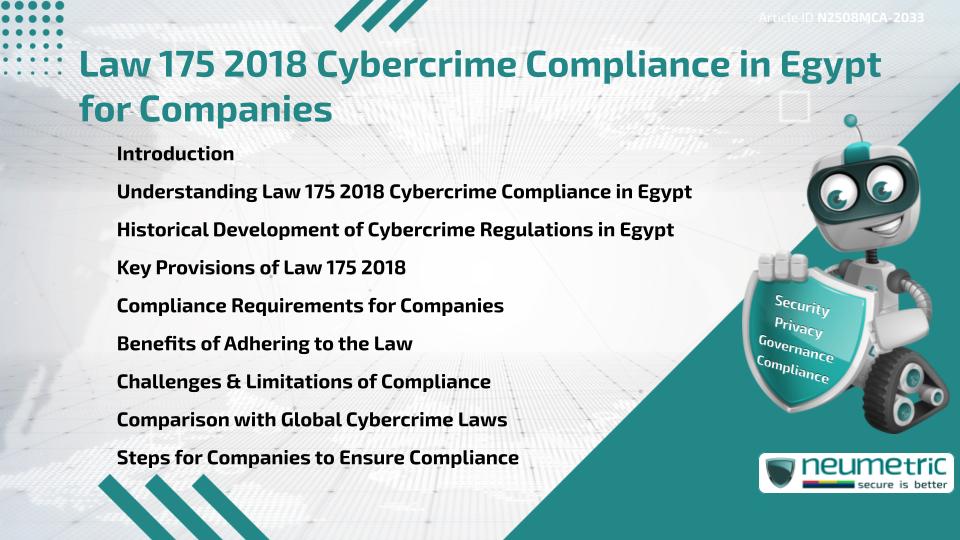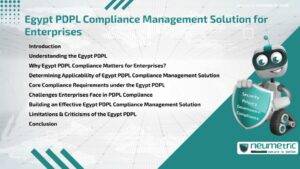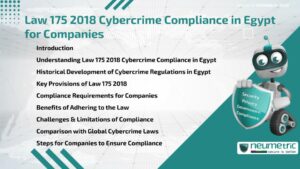Table of Contents
ToggleIntroduction
Law 175 2018 cybercrime compliance in Egypt is a crucial legal Framework that governs how companies handle, protect & monitor online activities within the country. It was introduced to combat cybercrime, safeguard digital rights & ensure lawful online conduct. The law imposes specific obligations on companies to maintain security, retain data & cooperate with authorities when required. For enterprises, compliance is not just a legal necessity but also a step towards building digital trust, preventing liability & protecting business reputation in an increasingly connected economy.
Understanding Law 175 2018 Cybercrime Compliance in Egypt
Law 175, passed in 2018, is formally known as the Anti-Cyber & Information Technology Crimes Law. It sets out clear responsibilities for internet service providers, digital platforms & companies operating online in Egypt. At its core, the law establishes penalties for cybercrimes such as hacking, fraud & unauthorized access. More importantly, it mandates enterprises to put in place Security Measures & cooperate with investigations. Law 175 2018 cybercrime compliance in Egypt is therefore both a preventive & responsive mechanism against digital Threats.
Historical Development of Cybercrime Regulations in Egypt
Before Law 175 was enacted, Egypt lacked a unified legal structure addressing cybercrime. Different rules existed in telecommunications, banking & Data Protection, but they were fragmented. The rise of social media, e-commerce & digital transformation highlighted the need for a comprehensive Framework. Law 175 of 2018 filled this gap by consolidating provisions, introducing penalties & creating a uniform compliance requirement for companies. Its development mirrors global trends where countries have sought stronger digital laws to safeguard economies & citizens.
Key Provisions of Law 175 2018
The law includes several important provisions, which companies must understand:
- Data Retention Obligations: Service providers must store User Data, including online activity, for a specified period.
- Access for Authorities: Companies must provide data access to judicial & security authorities when requested.
- Penalties for Non-Compliance: Fines & imprisonment apply to companies or individuals that fail to meet the requirements.
- Content Regulation: The law criminalises content that threatens national security or public morals.
- Cybercrime Offenses: Specific acts such as hacking, phishing & identity theft are covered with strict penalties.
These provisions form the backbone of Law 175 2018 cybercrime compliance in Egypt.
Compliance Requirements for Companies
To comply with the law, companies must take several measures:
- Establish Security Policies: Documented procedures for handling User Data & preventing breaches.
- Data Retention Systems: Technologies & systems to store User activity logs for the mandated duration.
- Incident Response Mechanisms: Clear protocols for reporting & responding to cyber incidents.
- Cooperation with Authorities: Readiness to provide data or technical assistance upon official request.
- Employee Awareness: Training staff to understand legal obligations & Risks.
These requirements ensure companies operate responsibly while avoiding legal consequences.
Benefits of Adhering to the Law
For companies, compliance brings several benefits beyond avoiding penalties. It enhances Customer Trust by showing commitment to lawful operations. It also reduces Risks of liability in the event of a cyber incident. Additionally, companies that comply are better positioned to collaborate with Government bodies & international partners, as compliance demonstrates maturity in digital Governance. By embedding compliance measures, companies also improve internal efficiency & reduce Vulnerabilities to attacks.
Challenges & Limitations of Compliance
Despite its importance, compliance with Law 175 presents challenges. The cost of establishing data retention systems & Security Measures can be high, particularly for smaller firms. Some provisions, such as broad obligations to share data with authorities, have raised concerns about Privacy & operational burdens. Additionally, the fast-changing nature of technology means companies must constantly update their systems to remain compliant. These limitations highlight the tension between enforcement & business practicality.
Comparison with Global Cybercrime Laws
Law 175 2018 cybercrime compliance in Egypt shares similarities with international frameworks but also shows unique characteristics. For instance, it resembles the Computer Misuse Act in the United Kingdom & the CFAA in the United States, both of which criminalise unauthorised access. However, unlike these, Law 175 places strong emphasis on data retention & cooperation with authorities. This reflects Egypt’s focus on national security while aligning with the global movement towards stronger digital regulation.
Steps for Companies to Ensure Compliance
Companies can take practical steps to ensure they meet the law’s requirements:
- Conduct a Legal Gap Analysis: Review existing practices against the provisions of Law 175.
- Update IT Infrastructure: Implement monitoring, logging & storage systems.
- Develop Internal Policies: Create Governance documents reflecting compliance obligations.
- Train Employees: Ensure staff understand the Risks of cybercrime & compliance expectations.
- Engage Legal & Technical Experts: Seek professional guidance for implementation & audits.
- Regular Audits: Schedule compliance audits to ensure ongoing adherence.
By following these steps, companies can proactively safeguard themselves while staying aligned with legal obligations.
Takeaways
- Law 175 2018 cybercrime compliance in Egypt establishes strict rules for digital conduct & data handling.
- Companies must focus on security, data retention & cooperation with authorities.
- Compliance builds trust, reduces liability & improves Governance.
- Challenges include costs, Privacy concerns & adapting to evolving technologies.
- The law aligns with international cybercrime frameworks while retaining a strong national focus.
FAQ
What is Law 175 2018 cybercrime compliance in Egypt?
It is the requirement for companies to align with Egypt’s Anti-Cyber & Information Technology Crimes Law, ensuring lawful & secure digital operations.
Why was Law 175 introduced in Egypt?
It was introduced to combat cybercrime, regulate digital activity & strengthen national security in the face of growing online Threats.
What happens if a company fails to comply with the law?
Non-compliance can result in fines, imprisonment or business restrictions depending on the severity of violations.
Does the law apply to all companies in Egypt?
Yes, it applies to internet service providers, digital platforms & any company handling online activity or User Data in Egypt.
How long must companies retain User Data under the law?
The law requires service providers to retain User Data for a period defined by regulations, typically months or longer.
Is compliance expensive for companies?
Compliance can be costly, especially for smaller enterprises, due to infrastructure & monitoring requirements.
How does Law 175 compare to international laws?
It shares features with laws like the CFAA in the US but places stronger emphasis on data retention & cooperation with authorities.
Need help for Security, Privacy, Governance & VAPT?
Neumetric provides organisations the necessary help to achieve their Cybersecurity, Compliance, Governance, Privacy, Certifications & Pentesting needs.
Organisations & Businesses, specifically those which provide SaaS & AI Solutions in the Fintech, BFSI & other regulated sectors, usually need a Cybersecurity Partner for meeting & maintaining the ongoing Security & Privacy needs & requirements of their Enterprise Clients & Privacy conscious Customers.
SOC 2, ISO 27001, ISO 42001, NIST, HIPAA, HECVAT, EU GDPR are some of the Frameworks that are served by Fusion – a SaaS, multimodular, multitenant, centralised, automated, Cybersecurity & Compliance Management system.
Neumetric also provides Expert Services for technical security which covers VAPT for Web Applications, APIs, iOS & Android Mobile Apps, Security Testing for AWS & other Cloud Environments & Cloud Infrastructure & other similar scopes.
Reach out to us by Email or filling out the Contact Form…





